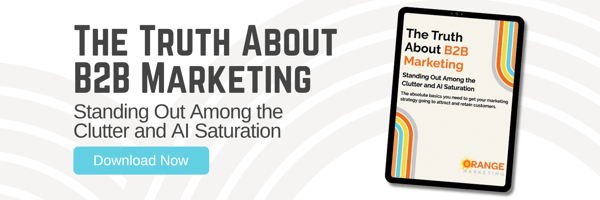
This morning when I woke up, I got an email that I have seen (and ignored) many times before. The sender promised to get our website on the first page of Google using SEO techniques that will get us a top 10 ranking. I instantly disregarded it, but I couldn’t help but wonder how many people end up doing business with these companies, only to see a momentary period of lackluster (and often artificial) ranking increase before returning back to their original position.
There is so much buzz around SEO, it seems as though many have forgotten that you are writing for your prospects and customers, rather than a search engine. Keep on reading to find out how you can generate more leads by writing valuable, prospect-oriented content.
Why You Still Need to Write For Google
Before we get into the importance of creating valuable content for your audience, I want to take a moment to explain that you cannot simply ignore the search engines. Although Google’s - and their competitors' - algorithms are incredibly intelligent, there is still plenty of work to be done on your end to ensure that they are able to read and understand the pages on your website, eventually giving your website a higher ranking in search engines.
This practice is known as Search Engine Optimization (SEO). A proper SEO strategy is one of the foundations of a good marketing strategy, and it is one of the best long-term investments a startup can make. In fact, we recommend startups begin working on their SEO (along with their content strategy) long before their official launch. Why? Well, this practice allows you to gain traction, and even become thought leaders your target audience believes in and follows, before you have to worry about selling your product to them.
The goal is to launch your product/service to an audience who has already familiar with your company (via blog posts, whitepapers, guides, etc.) and sees you as a credible source of information, rather than making the product launch your company’s first internet presence. Google loves to see a steady, organic increase in audience, and if you plan your launch strategically, you will be rewarded with faster audience growth and higher search engine rankings.

SEO Spotlight
There are many small improvements (using alt-tags, meta descriptions, etc.) that can be done to maximize your SEO efforts, but there is no replacement for writing content that is valuable to your audience. At the end of the day, you are not writing to robots and algorithms; you are writing to other humans who could be doing a million other things, but instead, they are taking the time to read your content. So write like it!
Remember, these are the people that you hope will become customers, and people ultimately end up buying from people they like. What better way to get someone to like you than by helping them solve a problem or learn something new about your industry?
What is the Inbound Methodology?
Now, you may be thinking, “Great, all I need to do to be successful is write enough keywords to get great SEO and I’ll be good to go!” While that strategy may have been viable 10-15 years ago, there is more to it if you actually want to see results and generate leads. You can’t simply write great SEO, because no one is going to want to read your stuff if you don’t have your audience in mind. This is where the inbound methodology comes into play.
The inbound methodology is one of the most effective ways to grow your business online. This method revolves around building mutually beneficial relationships with people in all stages of the buyer’s journey, helping them make the right decisions at the right time, and reach their goals. These people include consumers, prospects, customers, and anyone else related to your industry.
You must write relevant, useful, and engaging content in order to attract the right people to your website, while also letting Google and other search engines know that you are a thought leader and a trusted source of information. Here’s a great blog post on how you can make your content more fun to read, which is key if you want to keep your audience coming back for more.
As a founder, you are an expert in your field. Use your knowledge to your advantage! There are many different ways you can share what you know to create content. This includes writing blog posts, whitepapers, ebooks, guides… the list goes on and on. You can write content that caters to your audience because you know exactly who they are and what they need!

You can even take your knowledge to the world of social media in order to further build credibility and reach more of your audience. Social media is also a great way to build relationships in a unique, personal way that can’t be replicated on any other platform.
Any time you can share what you know with others, you should! Throughout the day, you can write down any content ideas you have, so you will always have a list of topics that you can turn into valuable content.
The more industry-specific topics you dive into on your website, the greater organic reach you will have. And it is this organic reach that allows you to continue cultivating relationships with prospects while improving your Google rankings. You want prospects to come to you knowing you’re a knowledge leader, and there is no better way to express your knowledge than creating valuable content on a variety of topics to showcase your expertise.
Content is King
Your audience is made up of people who are in different stages of the customer journey. Keep in mind that while some content might work really well for people in the awareness stage, that same content might not be as valuable for people in the consideration stage. And the content that is highly valued for people in the consideration stage might not be useful for those in the decision stage. This is why it is important to create a variety of content for each stage of the customer journey. You never know who is going to end up becoming a customer!

Let’s check out some of the different forms of content, and how they each can play an important role in generating traffic, leads, and most importantly, revenue!
Case Studies
Case studies are detailed stories about something your company did, often filled with statistics to prove the effectiveness of your product or service.
eBooks/Guides
B2B eBooks are great for educating your audience about new subjects or concepts, and usually include more graphical elements (artwork, pictures, infographics, etc.) to enhance the reading experience.
Whitepapers
Whitepapers are less flashy and more in-depth than eBooks and case studies. A good whitepaper uses research, evidence, and facts, instead of “sales-y” language, to inform the reader and equip them with the knowledge they need to make a decision.
Blog Posts
Blog posts are great for SEO, as they bring in organic traffic to your company website. Blogs allow you to keep an active presence on the internet, while also targeting niche audiences that can be difficult to reach.
Pillar Pages
Pillar pages are also great for SEO, but they utilize topic clusters to organize your content and help your pages rank higher.
While blog posts on their own are great for bringing traffic to your website, you can generate even more leads by writing ebooks and whitepapers. How do you turn these bigger pieces of content into more leads? It’s simple! Landing Pages! Landing pages require potential leads to provide an email, and any other information you want them to give you before they can download the piece of content they came for.
For example, let’s say you just finished writing an ebook. You can write a blog post that covers the basics of your ebook, and then give your readers the option to learn more about the topic by clicking on a call to action, that will take them to the landing page.
Once they are on the landing page, all they need to do is provide you with the required information and they can download the ebook. You get what you want, and they get what they want. It’s a win-win!
Just make sure to spend some time on your landing pages (you can even A/B test them!), because it’s the only thing standing in the way of an anonymous reader becoming a lead.

How Generating Valuable Content Helps Your Sales Team
The benefits of generating valuable content are not limited to your marketing team.
By generating valuable content, not only are you directly improving your online marketing efforts, but you are also equipping your sales team with tools that will help them do their job better, resulting in more business for you! Imagine your salesperson is sending out an email to a new client, where they are discussing setting up a meeting to go over their contract and seal the deal. Sounds pretty standard, right?
But what if, in that same email, your salesperson could include a few links to content that fit the new customer’s needs, such as a blog post that explains how you help your clients save money, or a case study that describes in detail how you helped a similar company solve their problems.
This puts both your client and your salespeople in a much better position going into the meeting, as the new client is now more familiar with your product, and they have already seen the results they can achieve by using your product.

Take Your B2B Content to the Next Level!
So there you have it. Now you know the “other side” of SEO, and why you shouldn’t completely focus on Google algorithms when you are creating content. At the end of the day, humans (your potential clients!) are the ones who are going to be reading and benefiting from the content you write, so make sure you keep that in mind.
We know it can be confusing to find the perfect mix of SEO and great, lead-generating content, especially when factoring in all the other aspects of B2B marketing. That is why we created our newest eBook, “The Truth About B2B Marketing”, where we discuss the importance of sticking to a sound B2B marketing strategy, and how it will generate steady revenue growth for years to come.
Check it out and reach out to us if you have any questions.

